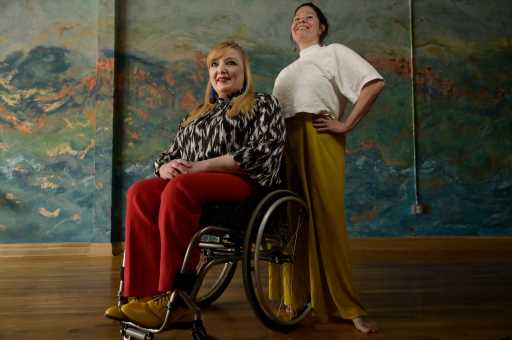Kate Nelson’s mind whirled as she watched what felt like an endless line of gorgeous models step up to audition for Denver Fashion Week in 2019.
“When you’re in a wheelchair, people tend to focus more on your disability than you,” said Nelson, a 46-year-old Denver accountant.. “I’ve always loved fashion, and my mother instilled in me that if you dress really well and have an element of fashion about you, they’ll notice you more than your disability.”
Despite not being 18 years old and having “giraffe legs,” as Nelson observed of other hopefuls, she beat several rounds of elimination to become Denver Fashion Week’s first runway model who used a wheelchair. She only wanted to make a point to the judges about how stereotypes have denied people with disabilities the chance to take part in the fashion world.
Now Nelson is returning to the runway as Denver Fashion Week debuts its first Inclusive Fashion show on Thursday, May 11, with the launch of the everyBODY clothing line. It’s part of a larger fashion-world trend toward adaptive clothing, which finds designers creating clothes that are easy to wear and customizable for people with diverse physical and mental disabilities — but that are also stylish and personality-driven.
Nelson will don designs from the everyBODY collection on her runaway stroll — in some cases switching outfits in a matter of seconds. That’s much easier with adaptive clothing, which serves people who “prefer Velcro over zippers, and who feel better accessing their clothes from the sides instead of overhead,” organizers wrote. Nelson praised items such as two-piece dresses that she can put on without assistance, and high-backed jeans that don’t slip down when she leans forward.
Wheelchair models first appeared on New York Fashion Week runaways in 2016, but the adaptive trend has accelerated with global designers and models with disabilities taking part. Influencer Kim Kardashian last year launched adaptive underwear designs as part of her body-diverse Skims collection, and this month’s cover of British Vogue features various disability activists.
But selling the idea of adaptive clothing is a still challenge when there’s little economic benefit to manufacturing clothes for a seemingly niche market, Nelson said. It’s reinforced by the tradition of able-bodied people as the mass-market design standard — or catalog size, as it’s called, which use statistical averages to estimate different body types.
“It feels like the fashion world is finally waking up to the idea of true inclusion,” said Mary Medellin Sims, founder of Guided by Humanity. Her Denver-based nonprofit offers adaptive yoga, support groups and other wellness activities for people with various disabilities. “But what does that really encompass when we’re talking about everybody?”
Sims and her partners at Resourceful Threads, the recycled clothing brand behind everBODY, will launch the new line during Thursday’s Inclusive show at the 36,000-square-foot venue The Brighton. Arriving near the end of the May 6-13 Denver Fashion Week, it doubles as a fundraiser for the “radically inclusive” Guided by Humanity. And even with its specialization, it seems a bit less niche next to hyper-focused shows such as Kids Couture and Streetwear & Sneakers.
“We’re not trying to take over a market and make ourselves rich,” said Rachel Kaplin, program manager at Guided by Humanity. “We’re trying to fill a need for our community. Not medical treatment, but wellness and mental health.”

Fashion model Nelson never thought of herself as such until a friend encouraged her to audition in 2019. The Littleton native lost the use of her legs after a 1979 car accident that killed her 33-year-old father, Garland, and 6-year-old brother, Brian. Doctors at Swedish Medical Center found that Nelson, who was 2 years old at the time, had fractured an arm, both legs, her pelvis and her skull in the hit-and-run tragedy. Nelson’s mother, Mary, died in 2019.
“As a kid I had to wear the leg braces that had shoes attached, and they looked like antique baby shoes. It wasn’t until middle school that they designed a leg brace that I could wear,” Nelson said through tears inside Guided by Humanity last month. “My first pair of real shoes were Reeboks.”
Reebok, coincidentally, is lending support to this week’s Inclusive Fashion show in the form of free shoes. The City of Denver has provided funding from its Creative Ideas program, and Meow Wolf Denver gave Guided by Humanity a free photo shoot and invitation to one of its own, upcoming fashion shows.
Fashion is crucial to seeing people with disabilities as more than just logistical problems, said Jocelyn Roy, an adaptive model who works with Guided by Humanity’s traveling, pop-up Smoothie Bus and the disability group The Wayfaring Band.
“I don’t go anywhere without wearing these,” said Roy, who has cerebral palsy, as she twiddled her dangly earrings. “They’re part of who I am. My mom basically bred into me that I should always look presentable and not dress inappropriately.” She stopped to laugh. “Which wasn’t always the case.”
“On the runway, you can be different characters, and you can make statements,” said Nelson, whose first runway experience was modeling adaptive bridal designs. “The next one I did the designer was building a black cage around my face and I was wearing skulls.”
The turn toward adaptive fashion shows no signs of stopping, Nelson added. That’s something she never could have imagined while growing up.
“We’ve had so much resistance and discrimination and disparities in our community, and now all of sudden we’re popular, and we’re trending,” she said. “I think because a lot of people can see little parts of themselves in someone like me.”
Subscribe to our weekly newsletter, In The Know, to get entertainment news sent straight to your inbox.
Source: Read Full Article
